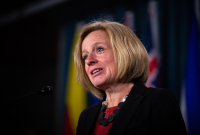Support strong Canadian climate journalism for 2025
Alberta Premier Rachel Notley is proposing Ottawa get into the crude-by-rail business — at least temporarily — so that producers in her province can get a better price for their oil.
"We are in the midst of putting together a specific business case that we'll be taking to the federal government late this week, early next week, where we lay out the specific costs," Notley said Monday following a meeting with energy industry leaders in Calgary.
Notley noted that Alberta heavy oil producers have been dealing with a punishing price gap between their product and U.S. light oil — in the order of around US$40 to US$50 a barrel in recent weeks.
"That means that more money is being taken out of the Canadian economy and sucked into American bank accounts," she said.
Absent new pipeline capacity connecting Alberta crude to international markets — like the stalled Trans Mountain pipeline expansion to the B.C. coast — Notley said moving oil on rail cars can be a stop-gap measure to help narrow the price discount.
And she said Ottawa should step up to making it happen, noting the federal government won't be recouping $2.6 billion it loaned to Chrysler in 2009 to keep the automaker afloat and save jobs.
"Surely if Ottawa can write off $2.6 billion in tax dollars paid to the auto industry in Ontario, it can support our oil industry with smart investments to help close the differential and return billions of dollars to the Canadian economy."
While Notley did not provide a price tag for the proposed federal crude-by-rail investment, she said it would be significantly less than the auto writeoff.
"More to the point, it's something that ultimately will be paid for by way of increased value to the federal government's own coffers, let alone to the economy," Notley said.
Keith Stewart, senior energy strategist with Greenpeace Canada, characterized the idea as "pouring good money after bad to subsidize oil companies."
"Premier Notley should be working with the federal government to make Alberta the leader in green energy development that it can and should be," Stewart said in an email.
"Those are the jobs of the future and as a bonus they won't fry the planet."
Notley did not specify what exactly the federal investment might look like, but noted more rail cars and locomotives are needed. She was adamant that she is not suggesting that oil supplant grain shipments on the railways.
She said it's statistically safer to move crude through pipelines than on railcars, so looking to trains is "not the best outcome."
But the plan to triple the capacity of the existing Trans Mountain pipeline between Edmonton and the B.C. Lower Mainland is in limbo. Ottawa bought the pipeline earlier this year from Kinder Morgan after the U.S. energy company became frustrated with a litany of political roadblocks.
In August, the Federal Court of Appeal quashed Trans Mountain's approval and now Ottawa is working to fulfil the court's requirement to consult Indigenous communities and consider the environmental impact of additional oil tankers off the coast.
In the meantime, Notley said, rail can provide some short-term relief for landlocked Alberta producers.
"There are some other ideas out there, but I think rail is one of the most immediate."





Comments
Just as long as the rails aren't anywhere near her residence... A little vacation to Lac Mégantic with that suggestion?
What does the word ‘safer’ mean in the statement “safer to move crude through pipelines than on railcars”? I asked a Kinder Morgan representative this question a couple of years ago; he clearly was uncertain but said it meant the percentage of oil that got delivered. In other words the more oil that leaked the less safe it was. I have two problems with this.
1) Using this definition, one finds the data do not support the assertion. Pipelines leaks are relatively less common than railcar leaks, but the quantity leaked per event is much larger.
In terms of the amount leaked per mass of oil moved per kilometer, the numbers are about the same according to a report by the Association of American Railroads a few years ago.
2) ‘unsafe’ normally refers to injury to people, or perhaps to other living matter. I have not seen any statistics that are relevant to this meaning.
People discussing the issue inevitably bring up Lac Megantic. This is not relevant because that was not ordinary oil, but an explosive. In any case a statistical conclusion should never be arrived at based on a single event.
If the bitumen is to be shipped anywhere (it shouldn’t) it should be sent by rail in the form of Canapux or bitumen pellets, or in heated insulated rail cars. Either way there is little or no danger from a spill.